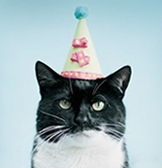 Last week we celebrated our second birthday! Can you believe we opened our doors over 730 days go? And, after a brief and puzzling visit to Analytics Land, I can share some equally mind-boggling numbers with you: over the past year we’ve hosted 143 events; shared a whopping 437 videos on our YouTube channel (with over 537 hours of watched footage); and had over 44,000 visitors to our website. Yes indeed, we’ve been a busy little bookstore—and it’s all because of you lovely people! Our heartiest thanks to everyone who has bought a book, shared a link, or taken part in an event. We really appreciate your support, and we’re so thrilled to be a part of Austin’s lively literary community.
Last week we celebrated our second birthday! Can you believe we opened our doors over 730 days go? And, after a brief and puzzling visit to Analytics Land, I can share some equally mind-boggling numbers with you: over the past year we’ve hosted 143 events; shared a whopping 437 videos on our YouTube channel (with over 537 hours of watched footage); and had over 44,000 visitors to our website. Yes indeed, we’ve been a busy little bookstore—and it’s all because of you lovely people! Our heartiest thanks to everyone who has bought a book, shared a link, or taken part in an event. We really appreciate your support, and we’re so thrilled to be a part of Austin’s lively literary community.
Of course, we couldn’t let our second anniversary pass us by without CAKE and a party. So last Saturday we threw an all-day birthday bash. We staged a communal reading of Kenneth Koch’s epic 100-stanza poem, “When the Sun Tries to Go On,” with our Curmudgeon in Chief, Joe Bratcher, starting and ending the reading. Other intrepid readers included Fernando Flores, Kurt Heinzelman, Dean Young, Tyler Gobble, Ken Fontenot, Jon Meador, Chris Brown, Teresa Roberson, Josh Ronsen, Jefffrey Dahlgren, David Jewell, Becky Garcia, Dave Oliphant, Polly Monear, W. Joe Hoppe, Schandra Madha, Tony Tobin, James M. Cullen, and Laura Perna. And yes, we collectively covered all 2400 lines!
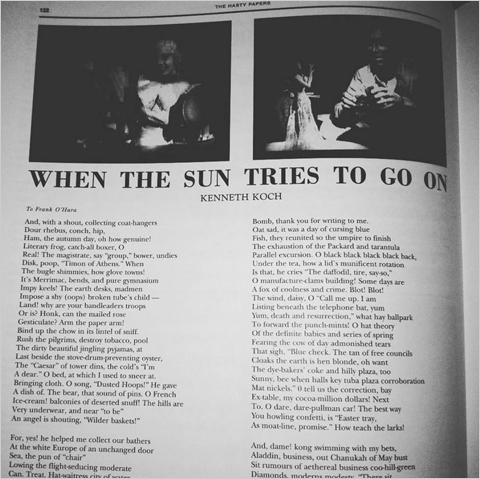
Then we tapped our feet to live music from Americana roots duo Mark Viator & Susan Maxey and played a few spirited rounds of Poetry Karaoke. If you missed out on the fun, do check out the footage below. And, to conclude with another astounding number, please note that the video of our EPIC reading clocks in at over three hours! Malvern Books, the bookstore that just won’t quit…

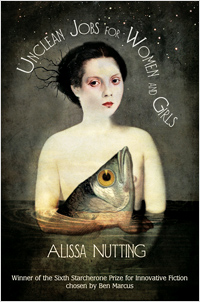 The experience of being a girl or woman is splayed open, truthful and messy innards on display, in Alissa Nutting’s short story collection
The experience of being a girl or woman is splayed open, truthful and messy innards on display, in Alissa Nutting’s short story collection 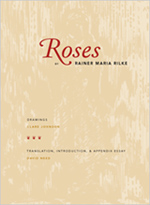 As someone with a profound respect for the modernist era, it is absolutely thrilling to see Rilke’s final batch of poems flawlessly translated and accompanied by such beautiful art and design. This bilingual collection was published posthumously, and it is rare in that it was originally written in French (telling for the Austrian writer). Roses also poses as a great contrast to the dramatic and serious collection Duino Elegies. The poems in Roses are fluid, tinged with love, warmth, wonder, and extraordinary depth. Translator David Need goes above and beyond, providing phenomenal insight and commentary throughout the second half of the book—bringing us closer and closer to mapping the mind of Rainer Maria Rilke.
As someone with a profound respect for the modernist era, it is absolutely thrilling to see Rilke’s final batch of poems flawlessly translated and accompanied by such beautiful art and design. This bilingual collection was published posthumously, and it is rare in that it was originally written in French (telling for the Austrian writer). Roses also poses as a great contrast to the dramatic and serious collection Duino Elegies. The poems in Roses are fluid, tinged with love, warmth, wonder, and extraordinary depth. Translator David Need goes above and beyond, providing phenomenal insight and commentary throughout the second half of the book—bringing us closer and closer to mapping the mind of Rainer Maria Rilke.
 We met Stella back in July, when she was touring the States and joined us for the midsummer edition of The Lion & The Pirate Unplugged (you can read more about her visit
We met Stella back in July, when she was touring the States and joined us for the midsummer edition of The Lion & The Pirate Unplugged (you can read more about her visit 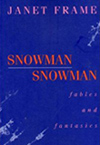 The texture of Janet Frame’s writing, often reminiscent of Joyce and the South American Clarice Lispector, can at times be a little thick, let’s face it, but the poetry in her language is always intact. This book compiles what are considered to be Frame’s ‘stories of the fantastic,’ in the faerie tale tradition of the dark and the morbid.
The texture of Janet Frame’s writing, often reminiscent of Joyce and the South American Clarice Lispector, can at times be a little thick, let’s face it, but the poetry in her language is always intact. This book compiles what are considered to be Frame’s ‘stories of the fantastic,’ in the faerie tale tradition of the dark and the morbid.